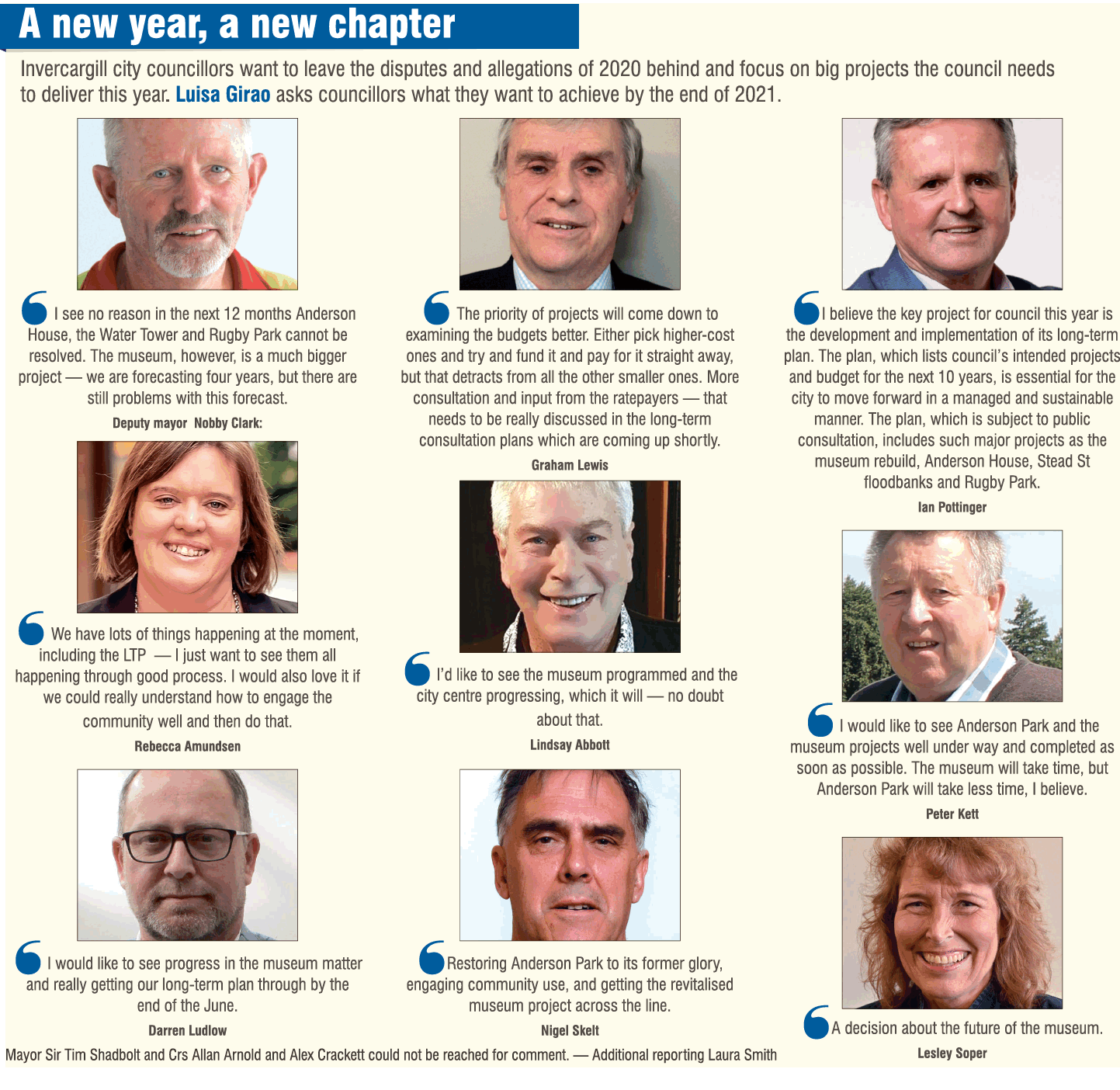
Clare Hadley will not "shy away" from a challenge.
Working in local government for about 30 years, the Invercargill City Council chief said she had got used to dealing with all kinds of hurdles and dramas.
Last year, her council hit the headlines after a Department of Internal Affairs (DIA) probe which raised concerns about a "significant conflict"at the council.
Instead of lingering on the negatives exposed during the process, she wanted to take a proactive approach - focusing on what the council did well, improving what needed to be done for the council’s next chapter.
"When we were recruiting [last year, to fill some of the council’s positions], people were asking about the DIA. I told them - this is such an opportunity to really make a difference, this is not working as normal."
Mrs Hadley believed 2021 would be an extremely important and exciting year for the council.
From her office window, she could see three construction cranes which symbolised a city renewed.
She believed while other New Zealand cities underwent major structural change in the 1980s and a cultural change in the 2000s, Invercargill was showing this progress now.
"Everywhere [else] worried about being a funky little city, and - quite frankly - Invercargill didn’t worry about being funky.
"You are seeing that change happening now. You are seeing the opportunity for that change happening now."
Councillors and staff were working on the council’s long-term plan which would be put out for consultation in April.
Major decisions and important projects were part of the document, including the inner-city master plan, consultation about Rugby Park and Surrey Park grandstands and revamping the community’s beloved Southland Museum and Art Gallery.
She said the council’s first project to get across the line this year would be the Splash Palace hydroslide in March which was delayed by a year due to the Covid-19 pandemic’s effects.
She, councillors and senior council staff would tour all the council’s facilities soon to be updated and understand the challenges.
Putting the capital projects to the side, Mrs Hadley would also focus on staff, a better organisational performance and relationships.
She said people would start to notice changes in the way the council presented itself in terms of brand, presentation and recognition.
"You will see us consolidate. We are making some changes in relation to how we interact with the customer and we have an ongoing and quite ambitious programme in terms of better systems and processes so staff can deliver those things I’m saying."

Mrs Hadley also thought the internal relationship - which was a concern highlighted by DIA - had already improved.
"I think [council] had a real enthusiasm for thinking about how relationships can be improved and making positive steps.
"There is an element of, ‘Hey, I’m doing this in the best way ... If I approach this in a different way, would I get a different outcome?’
She said she had already seen that positive attitude.
WHEN questioned about her own relationship with mayor Sir Tim Shadbolt, she said everything that needed to be said had been said.
However, she thought the council, as a whole, wanted to work together to address any shortcomings they might have.
"We want to work to fill each other weakness, to fill the gaps."
They would also look this year at how to help Sir Tim as he said he would like to have support.
She acknowledged the role of mayor had changed a lot since she started in local government in 1988.
"The expectation of the community on the mayor has changed significantly.
"Let’s have a look into that - How other mayors perform? What do they need? What do we need here? What does the council need as a whole given the feedback we had in our review of governance?"
When Mrs Hadley was appointed as chief executive in 2018, she replaced Richard King, who had been in the role for about 30 years.
Since her appointment, some councillors and part of the community had been vocal about the way she did her job.
Mrs Hadley admitted local government roles were not easy, but she and other local representatives did their jobs "for making a difference for the community and the city".
When asked whether she thought the criticism would be the same if it was a man in her role, she replied, "It would be fair to observe that how criticism is levelled at people may have a relationship with gender."
"We’ve got all sorts of unconscious bias in our views, there’s a lot more women in senior positions but we do still have some unconscious bias about how we view those."
She just focused on the job, she said.
"I was encouraged by my family upbringing to see gender as irrelevant."
Looking forward, Mrs Hadley said she was very happy in the job and had no plans to leave.
Better performance, rebuilding the council’s reputation and recovering community trust were what she would work hard to help the council achieve this year, she said.
Comments
Good luck with restoring confidence in the council. Unfortunately there are a lot of people within council who are ingrained with the bureaucratic mindset. However, change starts at the top.











